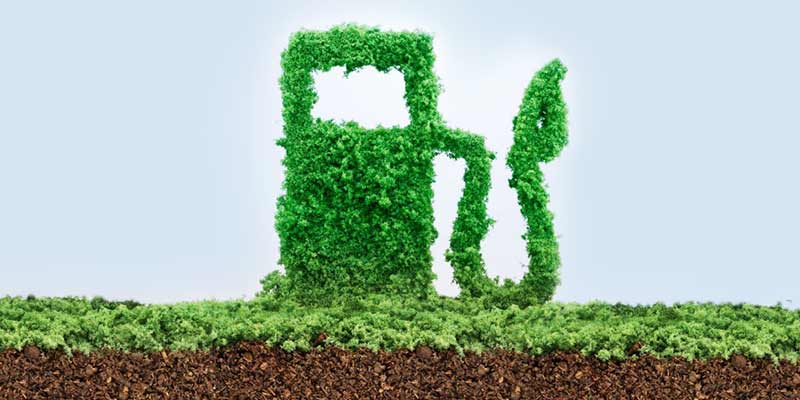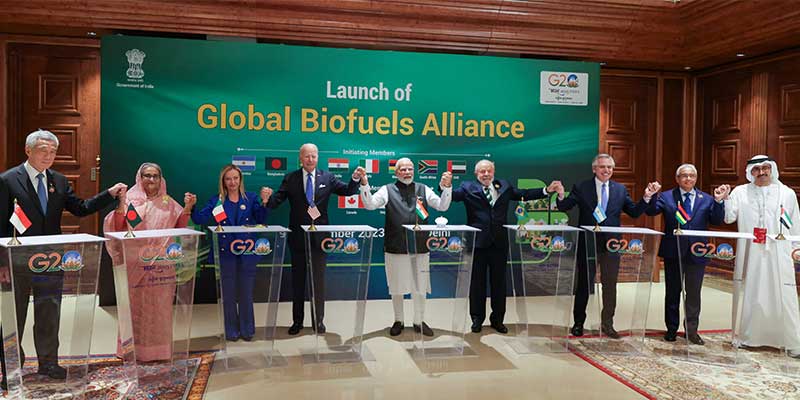- India
- May 11
Explainer - What is Global Biofuels Alliance?
• The Global Biofuels Alliance (GBA), which was launched in September 2023, has reportedly adopted a work plan focused on assessing country landscapes, drafting policy frameworks, and conducting biofuel workshops.
• This plan got approved at a key meeting of the body held on the sidelines of the G20 deliberations in Brazil last month.
• India has reportedly proposed three workstreams to support biofuel trade, raise awareness, and enhance adoption.
• However, uncertainty persists regarding the launch date and the GBA’s Secretariat.
What is Global Biofuels Alliance?
• In September 2023, the Global Biofuels Alliance (GBA) was launched by Prime Minister Narendra Modi along with a host of global leaders including US President Joe Biden, Brazilian President Luiz Inacio Lula da Silva, Bangladesh Prime Minister Sheikh Hasina and Italian Prime Minister Giorgia Meloni on the sidelines of the G20 Summit.
• The GBA mirrors the International Solar Alliance (ISA) piloted by New Delhi and Paris in 2015 to bring clean and affordable solar energy within the reach of all.
• GBA is an India-led initiative to develop an alliance of governments, international organisations and industry to facilitate adoption of biofuels.
• Bringing together the biggest consumers and producers of biofuels to drive biofuels development and deployment, the initiative aims to position biofuels as a key to energy transition and contribute to jobs and economic growth.
• The initiating members of the Alliance are India, Argentina, Bangladesh, Brazil, Italy, Mauritius, South Africa, the UAE and the US. Canada and Singapore are observer countries.
• As many as 24 countries and 12 international organisations have agreed to join the alliance.
Significance of this Alliance
• Biofuels are derived from renewable biomass resources and wastes such as plastic, municipal solid waste, waste gases, etc.
• It seeks to provide a higher degree of national energy security in an environmentally friendly and sustainable manner by supplementing conventional energy resources, reducing dependence on imported fossil fuels and meeting the energy needs of India’s urban and vast rural population.
• India, which imports over 85 per cent of its crude oil needs, is gradually building capacity to produce fuel from such items as crop stubble, plant waste, and municipal solid waste.
• While India is on schedule to double the mixing of ethanol extracted from sugarcane and agriculture waste to 20 per cent with petrol by 2025, it is also setting up dozens of compressed biogas (CBG) plants.
• The Global Biofuels Alliance is aimed at facilitating cooperation and intensifying the use of sustainable biofuels across sectors, including transportation.
• Its focus is primarily on strengthening markets, facilitating global biofuel trade, developing concrete policy lesson-sharing and providing technical support for national biofuel programmes worldwide.
• Such an initiative is also aimed at helping India’s transition to alternative fuels and cutting its import bill, as the country seeks to achieve its net-zero carbon emissions goal by 2070.
• GBA will support worldwide development and deployment of sustainable biofuels by offering capacity-building exercises across the value chain, technical support for national programmes and promoting policy lessons-sharing.
• It will facilitate mobilising a virtual marketplace to assist industries, countries, ecosystem players and key stakeholders in mapping demand and supply, as well as connecting technology providers to end users.
• It will also facilitate development, adoption and implementation of internationally recognised standards, codes, sustainability principles and regulations to incentivise biofuels adoption and trade.
• The initiative will be beneficial for India at multiple fronts.
• The alliance will focus on collaboration and will provide additional opportunities to Indian industries in the form of exporting technology and exporting equipment.
• It will help accelerate India’s existing biofuels programmes.
• The global ethanol market was valued at $99.06 billion in 2022 and is predicted to grow at a Compound Annual Growth Rate (CAGR) of 5.1 per cent by 2032 and surpass $162.12 billion by 2032.
Manorama Yearbook app is now available on Google Play Store and iOS App Store


